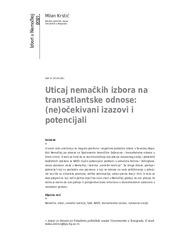Prikaz osnovnih podataka o dokumentu
Uticaj nemačkih izbora na transatlantske odnose: (ne)očekivani izazovi i potencijali
The impact of the German elections on transatlantic relations: (un)expected challenges and opportunities
| dc.creator | Krstić, Milan | |
| dc.date.accessioned | 2022-09-27T10:00:16Z | |
| dc.date.available | 2022-09-27T10:00:16Z | |
| dc.date.issued | 2021 | |
| dc.identifier.issn | 2217-6233 | |
| dc.identifier.uri | http://rfpn.fpn.bg.ac.rs/handle/123456789/894 | |
| dc.description.abstract | U ovom radu analiziraju se moguće pozitivne i negativne posledice izbora u Saveznoj Republici Nemačkoj po odnose sa Sjedninenim Američkim Državama i transatlatnske odnose u širem smislu. U radu se tvrdi da su razmimoilaženja oko pitanja nuklearnog oružja i potrebnih budžetskih izdataka za NATO ključni potencijalni problemi u odnosima Berlina i Vašingtona, nakon promene vlade u Nemačkoj i dolaska „semafor koalicije”. Sa druge strane, postoje i potencijali koji su posledica ove promene, a koji se odnose na veće približavanje u pitanjima kao što su klimatske promene, zaštita demokratije, odnos prema Rusiji i Kini. U radu se daje pregled na koji način partije koje čine novu vlast u Nemačkoj gledaju na ova pitanja, te koliko je realno da ove pretnje ili perspektive budu aktivirane u transatlantskim odnosima u narednom periodu. | sr |
| dc.description.abstract | This paper analyzes the possible positive and negative consequences of the elections in the Federal Republic of Germany on relations with the United States and transatlantic relations in a broader sense. The paper claims that disagreements over the issue of nuclear weapons and the necessary budget expenditures for NATO are the key potential problems in relations between Berlin and Washington, after the change of government in Germany and the arrival of the “traffic light coalition”. On the other hand, there are also several potentials for deepen- ing the relations between Washington and the new government in Berlin, which are related to greater normative convergence in issues such as climate change, protection of democracy, relations with Russia and China. The paper gives an overview of how the parties that make up the new government in Germany view these issues, and how realistic it is that these threats or opportunities will be activated in transatlantic relations in the coming period. | sr |
| dc.language.iso | sr | sr |
| dc.publisher | Centar za demokratiju Fakulteta političkih nauka : Beograd | sr |
| dc.rights | openAccess | sr |
| dc.rights.uri | https://creativecommons.org/licenses/by/4.0/ | |
| dc.source | Politički život | sr |
| dc.subject | Nemačka | sr |
| dc.subject | izbori | sr |
| dc.subject | semafor koalicija | sr |
| dc.subject | SAD | sr |
| dc.subject | NATO | sr |
| dc.subject | transatlantski odnosi | sr |
| dc.subject | nuklearno oružje | sr |
| dc.subject | Germany | sr |
| dc.subject | elections | sr |
| dc.subject | coalition traffic light | sr |
| dc.subject | USA | sr |
| dc.subject | NATO | sr |
| dc.subject | transatlantic relations | sr |
| dc.subject | nuclear weapons | sr |
| dc.title | Uticaj nemačkih izbora na transatlantske odnose: (ne)očekivani izazovi i potencijali | sr |
| dc.title | The impact of the German elections on transatlantic relations: (un)expected challenges and opportunities | sr |
| dc.type | article | sr |
| dc.rights.license | BY | sr |
| dc.citation.epage | 35 | |
| dc.citation.spage | 25 | |
| dc.citation.volume | 21 | |
| dc.identifier.fulltext | http://rfpn.fpn.bg.ac.rs/bitstream/id/2182/fulltext.pdf | |
| dc.identifier.rcub | https://hdl.handle.net/21.15107/rcub_rfpn_894 | |
| dc.type.version | publishedVersion | sr |

